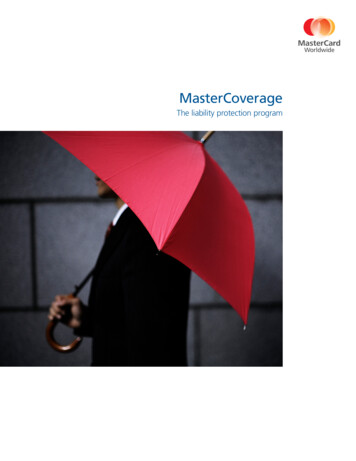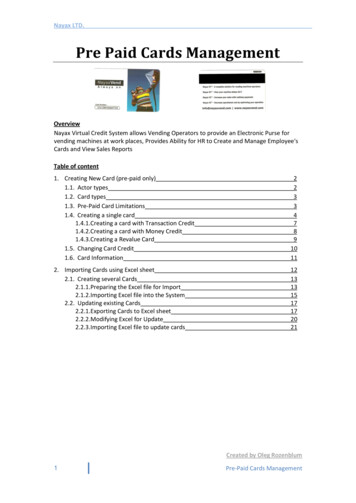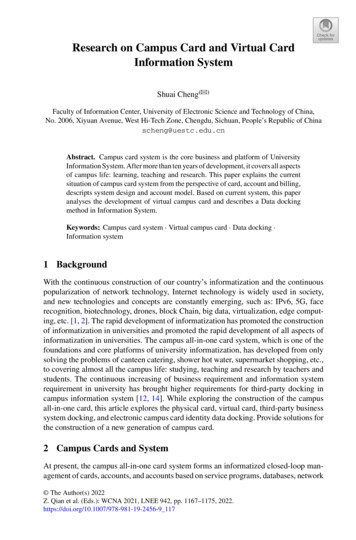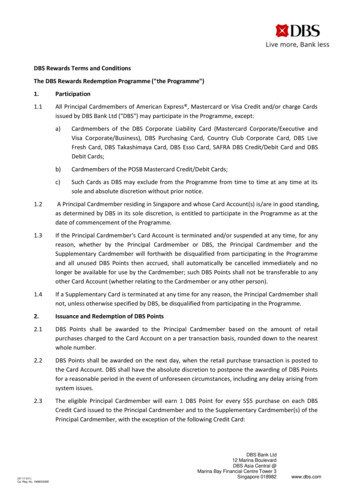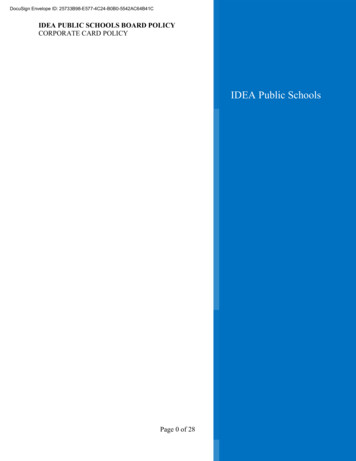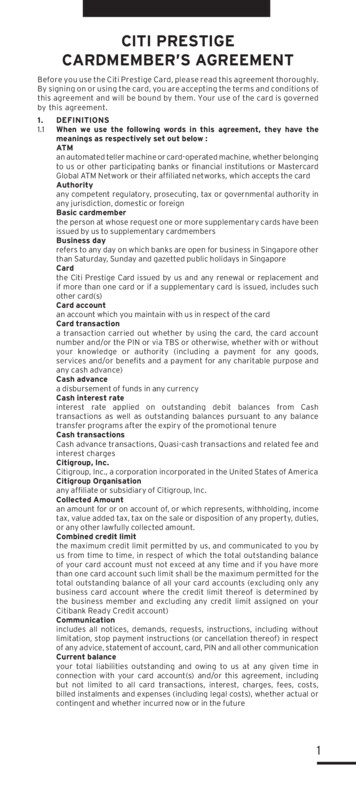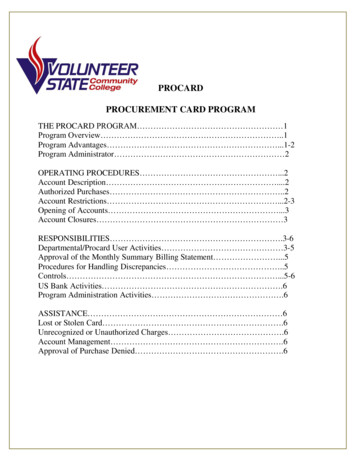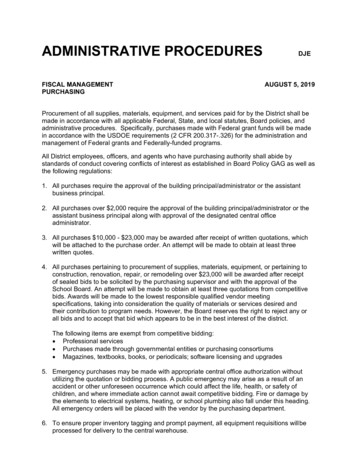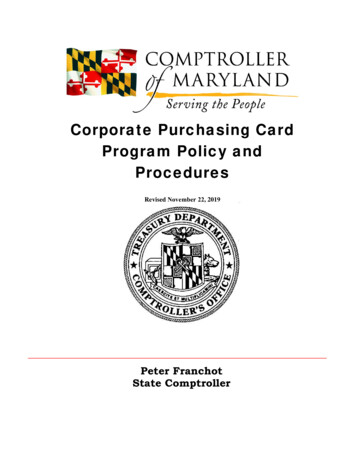
Transcription
Corporate Purchasing CardProgram Policy andProceduresRevised November 22, 2019Peter FranchotState Comptroller
Table of ContentsPageCorporate Purchasing Card Overview. . Introduction (Section 1) Corporate Purchasing Card Oversight (Section 2).Agency Implementation Guidance (Section 3). .Roles and Responsibilities (Section 4). .Corporate Purchasing Card Assignment Guidelines (Section 5).Requesting a Corporate Purchasing Card (Section 6). Issuing Corporate Purchasing Cards (Section 7). .How the Corporate Purchasing Card Works (Section 8).Corporate Purchasing Card Use (Section 9). .Cardholder Limits (Section 10). .Corporate Purchasing Cards Security (Section 11). .Record Keeping (Section 12). .Corporate Purchasing Card Documentation (Section 13) .Corporate Purchasing Card Record Retention (Section 14) .Corporate Purchasing Card Abuse (Section 15) .Reports (Section 16) Posting and Payment Distribution (Section 17) Defective Merchandise (Section 18) .Disputes (Section 19) Lost or Stolen Cards (Section 20) .Retrieving, Closing, and Suspending (Section 21) .Issuing Corporate Travel Accounts (Section 22) .Travel Account Use (Section 23) .Definitions (Section 24) Forms and ExhibitsCorporate Purchasing Card Contact Information and Card Vendor DefinitionsCardholder Agreement Form - Exhibit ACardholder/Travel Agreement Form -Exhibit A1New Application Cardholder Information Form - Exhibit BNew Application Travel Account Information Form - Exhibit B1New Application Cardholder Information Form Emergency Use Card- Exhibit B2Cardholder Information Maintenance Form - Exhibit CCardholder Statement of Disputed Item Form - Exhibit DCardholder Activity Log - Exhibit EAccount Code Number Set Up Guidelines - Exhibit FPosting and Payment Distribution Process - Exhibit GAuthorized Reviewer Agreement –Exhibit HAuthorized Reviewer Agreement Travel –Exhibit H1Agency Purchasing Card Program Administrator (PCPA) Agreement –Exhibit IMonthly Certification Letter – Exhibit JInstructions to run an Detailed Transaction Report with Level 3 Data in AccessOnline –Exhibit KPurchasing Card Surcharge Fees–Exhibit L1223356778101111131515161717171718181920
COMPTROLLER OF MARYLANDGENERAL ACCOUNTING DIVISIONCORPORATE PURCHASING CARD POLICY AND PROCEDURES MANUALCORPORATE PURCHASING CARD OVERVIEWBACKGROUNDThe Comptroller of Maryland’s General Accounting Division provides central management and administration for the StateCorporate Purchasing Card Program. State agencies must comply with policies, procedures, and instructions containedin this manual for use of the purchasing card. Failure to comply will result in the suspension and/or termination ofcards.A Statewide Corporate Purchasing Card Steering Committee provides oversight for the review and approval of all policiesand procedures. Additionally, the Steering Committee monitors card activity reports to make improvements in the State’sprocurement systems.The Corporate Purchasing Card Program saves time and money. By allowing the bank and the merchants to process most ofthe paperwork, the state eliminates the need to issue purchase orders and reduces the number of invoices and checks utilizedin the purchasing/procurement process. It helps agencies obtain small dollar value items in a more efficient and cost effectivemanner. Vendors also benefit by eliminating invoices and receiving payments normally within two days of the purchases.While it is the intent of the program to improve the efficiency and effectiveness of the agency's small dollar procurements,nothing in this policy and/or procedures is intended to replace current policy and/or procedures defined in the Finance andProcurement Article or in COMAR Title 21, or included in your agency's internal policies and procedures. The guidelines inthis manual are to act as the minimum standards for the operation of the Corporate Purchasing Card Program. Agencies mayestablish supplemental procedures that are more stringent than the rules established in this manual.Corporate purchasing cards and card services are contracted by the State. The General Accounting Division is responsiblefor the management of the statewide corporate purchasing card contract. The contact information for the current card vendoris contained in the Contact Information section of this manual.BENEFITSThe corporate purchasing card system benefits the State of Maryland by reducing paperwork, cost, and processing ofaccounts payable for small dollar purchases. Vendors who accept corporate purchasing cards are paid much faster. The Statereceives an annual rebate from the card vendor.MBE/WBE/SBR REPORTINGThe Comptroller of Maryland’s General Accounting Division has developed a program that matches a State certifiedMinority Business Enterprise, Small Business Reserve and Veteran Owned Business lists the corporate purchasing cardtransaction data. The results of the program match can be viewed in R*STARS’s VIEWDIRECT as follows: The Minority Business Enterprise report is A30USB11 The Small Business Reserve Reporting is A30USB12 The Veteran Owned Business is A30USB13Since the card vendor’s data uses unedited taxpayer identification numbers provided by the merchant, you may need to makemanual corrections to the report based on your review of the statistics reported for each taxpayer identification number andname combination reported.CONTROLSThe State of Maryland Corporate Purchasing Card Program uses both internal management controls, as well as features andreports from the card vendor’s system, to manage and review the process to ensure that procedures are followed.Participating agencies and cardholders are required to adhere to all guidelinesoutlined in the CPC Manual. Failure to comply with this manual or failure to complywith any special directives from the General Accounting Division may result in thesuspension and/or termination of either select card(s) or the entire agency.Page 1
COMPTROLLER OF MARYLANDGENERAL ACCOUNTING DIVISIONCORPORATE PURCHASING CARD POLICY AND PROCEDURES MANUALSTATE OF MARYLANDCORPORATE PURCHASING CARD PROGRAMSECTION 1INTRODUCTION.01This policy covers the implementation of the Corporate Purchasing Card Program andestablishes minimum standards for possession and use of corporate purchasing cards.02The Corporate Purchasing Card Program was established to save the state time andmoney. By allowing the bank and the merchants to process most of the paperwork,the state eliminates the need to issue purchase orders, reduces the number of invoicesand checks utilized in the purchasing/procurement process. It helps agencies obtainsmall dollar value items in a more efficient and cost effective manner. Vendors alsobenefit by eliminating invoices and normally receiving payment within two days of thepurchases.03While it is the intent of the program to improve the efficiency and effectiveness of theagency’s small corporate purchasing methods, nothing in this policy and/or proceduresis intended to replace current policy and/or procedures defined in the Finance andProcurement Article or in COMAR Title 21, or included in your agencies internalpolicies and procedures. The guidelines in this manual are to act as the minimumstandards for the operation of the Corporate Purchasing Card Program. Agenciesmay establish supplemental procedures that are more stringent than the rulesestablished in this manual.SECTION 2CORPORATE PURCHASING CARD OVERSIGHT.01The Comptroller of Maryland’s General Accounting Division is responsible for theStatewide contract administration of the Corporate Purchasing Card Program. TheGeneral Accounting Division will issue overall policy guidance, pay the bank for allpurchases/credits made by participating agencies, and post related agencycharges/credits to the central financial accounting system.02Each agency is responsible for determining if a purchase under this program meetsstate law, regulations, policies, and procedures. The agency’s internal audit staffshould take an active role in these determinations.03The approving officer (agency head), or their designee, is responsible for designatinga Purchasing Card Program Administrator (PCPA) who shall function as the agency'sliaison between their cardholders, the bank, and the Comptroller of Maryland. Thisindividual should have the authority to make decisions about CPC for that agency.04The agency's fiscal officer is responsible for the fiscal oversight of the agency'sCorporate Purchasing Card Program. The agency's fiscal officer, or individualdesignee of the agency's fiscal officer, will assign the agency PCPA,will approve theissuance of cards, ensure prompt reconciliation of monthly bank statements, andprepare statistics and reports necessary to manage and control all card activity.05In the event that a new PCPA is assigned, the agency's fiscal officer is responsible fornotifying GAD to ensure the removal of the former PCPA's access to the CPCsoftware and creation of the new PCPA account.06The agency's fiscal officer or designee is responsible for the proper setup andmaintenance of the Account Code Numbers assigned to each cardholder. TheGeneral Accounting Division will provide the necessary guidelines (Exhibit F) andassist the agency to accomplish the task.Page 2
COMPTROLLER OF MARYLANDGENERAL ACCOUNTING DIVISIONCORPORATE PURCHASING CARD POLICY AND PROCEDURES MANUAL.06The responsibility for the program rests with the assigned agency's PCPA, theAuthorized Reviewer, the agency’s internal audit staff, and the agency Fiscal Officer.The Comptroller’s Office will primarily coordinate all program activities through thePCPA and provides general oversight for the program.SECTION 3AGENCY IMPLEMENTATION GUIDANCEAgencies must have specific policies and procedures to implementthis program. The provisions of this policy statement need not be repeated in the.01agency policy; however, these minimum standards must be met. If an agencydeviates from the CPC Policy and Procedures Manual that agency must submit aplan in writing and receive the approval of the CPC Steering Committee beforeproceeding. The plan must address how the agency is going to limit fraud, waste andabuse on the card.02Agency policies should address any purchases that the agency wishes to prohibit orfurther restrict, in addition to, those purchases prohibited or restricted by this policy.03Agency policies should address the Activity Log review process,required approvals and authorizing procedures.04The Corporate Purchasing Card's state policy will be available to all personnelresponsible for the implementation and maintenance of the program via theComptroller of Maryland’s nment Services/State Accounting Information/Corporate Purchasing Card/.05The State of Maryland's Corporate Purchasing Card Cardholder Agreement Form(Exhibit A) will state relevant provisions of this policy. The employee must sign thisform.ROLES AND RESPONSIBILITIESSECTION 4In addition to the responsibilities outlined in Section 3, the General Accounting Division andagencies have the following responsibilities to ensure the management and control of the statewidesystem.General Accounting Division.01a.b.c.d.e.f.g.h.i.j.k.l.m.Provides overall control of the programMaintains the CPC Policy and Procedures ManualCoordinates access to card vendor’s reporting program and PCPA trainingVerifies the Single Purchase Limit, Monthly Credit Limits, and 23-digit account numbersReceives the electronic Statement Billing File from the card vendorVerifies the Statement Billing File dataControls the interface into R*STARSIs the main contact with the card vendor regarding issues and problemsEnsures that CPC problems are resolved in a timely mannerQuestionable Purchase ReviewProvides trainingOverrides Merchant Category Code blocks only for emergencies or special circumstancesMonitor receipt of monthly CPC CertificationsPage 3
COMPTROLLER OF MARYLANDGENERAL ACCOUNTING DIVISIONCORPORATE PURCHASING CARD POLICY AND PROCEDURES MANUALn.o.Maintains the list of agency card recipients.Maintains the list of agency PCPAs.Agency.02a.b.c.d.e.f.g.h.i.Identifies, adds, deletes, and modifies cardholder information online in the card vendor’ssoftware packageAssigns an Authorized Reviewer to every cardholderCompletes the required agreement forms and ensures forms are approved and signed bythe appropriate peopleTrains the cardholders in the proper use of the card and reconciliation process adapted bythe agencyEnsures that the transactions are proper, necessary, and “Furthers the business of theState”Ensures that the purchase price of the item is reasonableEnsures cardholders1. Complete the Cardholder Logs2. Receives a Monthly Bank Statement from the card vendor3. Reconciles the Monthly Bank Statement to the Cardholder Log4. Verifies all purchases listed or disputes the transactions that are unauthorized5. Sign the Monthly Bank Statement and the Cardholder log(s) signifying that thereconciliation is complete6. Gives the Monthly Bank Statement, Cardholder log(s) and all receipts to theAuthorized Reviewer within seven (7) days of receipt of the Monthly BankStatement.Authorized reviewers review the Cardholder log(s), Monthly Bank Statement, andreceipts to ensure1. All transactions are accounted for when the log and Monthly Bank Statement arereconciled2. That all receipts are present and appear legitimate3. The description of the item on the Cardholder log(s) matches the description ofthe item on the receipt and the Monthly Bank Statement4. The item or service purchased was necessary and that the transaction “Furthersthe Business of the State”5. The price was reasonable6. Personally verifies random items on a monthly basis and ensures that the itemlisted on the Cardholder log(s) are in fact the items being purchased by thecardholder. CPC Level 3 Transaction Report will be used MONTHLY by theAuthorized Reviewer or Agency Designee to check the item descriptions listedon the Cardholder log(s) to ensure that the item reported on the log is the itemlisted under item description. Authorized Reviewer or Agency Designee willdocument this action and forward it, with the other CPC documents to theAgency Fiscal Officer. Any discrepancy needs to be reported to the agency’sSenior Management immediately. The PCPA will notify GAD. If theCardholder CPC package of Monthly Bank Statement, Cardholder log(s) andreceipts match, the Authorize Reviewer will sign the log(s) and the MonthlyBank Statement signifying that the reconciliation is complete.Agency Fiscal Officer or designee will receive the signed Cardholder CPC packageconsisting of the Cardholder log(s), Monthly Bank Statement, and receipts.1. Ensure that both the cardholder and the Authorized Reviewer signed thedocuments; if not it should be returned to the Authorized Reviewer2. Ensure that the purchase looks legitimate (to avoid collusion)3. That the purchases “Further the Business of the State”4. That the amount charges enter into R*STARS by GAD for the monthly CPCcharges are the same as the totals on the CPC logs.Page 4
COMPTROLLER OF MARYLANDGENERAL ACCOUNTING DIVISIONCORPORATE PURCHASING CARD POLICY AND PROCEDURES MANUAL5.Ensures that the Cardholder CPC packages (Cardholder Logs, Monthly BankStatement, and receipts) are filed in an easily retrievable and secure manner forfuture review6. Report any problem to the agency PCPA or GAD depending on the nature of theproblem7. Ensures that any gifts, incentives, or rebates as a result of a CPC purchase areturned over to the State and are used for State business.8. Provides monthly certification to the General Accounting Division9. Ensures that CPC cardholders are utilizing State Contracts when applicable.10. Ensures that property, equipment, and inventory purchased with the CPC areaccounted for following the Department of General Services Guidelines.11. Run reports on the card vendor’s reporting program software.03Office of Legislative Auditsa.b.SECTION 5Identifies Fraud, Waste, and Abuse in spendingReport 24 hours a day by calling 1-877-FRAUD11 (1-877-372-8311) or by internetwww.ola.state.md.usCORPORATE PURCHASING CARD ASSIGNMENT GUIDELINESThe following guidelines will apply to the assignment of the Corporate PurchasingCards:.01a.b.c.d.e.f.g.h.i.Limited to State of Maryland employees; no volunteers, contractors, county or federalemployees. Part time and contractual employee are allowed a card if paid by the CentralPayroll Bureau.PCPAs cannot have a corporate purchasing card. Any exception to this must be approvedby GAD;Limited to employees who have not had personnel incidents which impact the use of thecard;Limited to employees specifically approved by agency head or agency head designee andauthorized to purchase items and spend State funds;Limited to employees who sign a Corporate Purchasing Card agreement and who will besubject to personnel discipline procedures in the event of abuse or failure to comply withestablished guidelines;Requires PCPA and agency fiscal officer (or designee) to approve the issuance of a card;Monthly credit card limits should be consistent with the authorized monthly spending limitsestablished by the agency. Credit limits should not be substantially greater than thecardholders’ pre-authorized monthly spending authority; and1. Credit limits over 5,000 need the approval of the Agency Fiscal Officer on NewApplication Cardholder Information Form or the Cardholder InformationMaintenance Form2. Credit limits should be reviewed annually by the PCPA to ensure that the currentlimit is in line with the cardholders monthly spending trends3. Credit limits over 50,000 need email approval from the General AccountingDivision. Excessive credit limits without prior approval may be decreasedwithout notice by GADCards no longer in use, or where no purchasing activity has been recorded for a 6-monthperiod, must justify to the agency PCPA why they still need a card. If the agency PCPAdetermines that a card should remain active after a period of 6-month inactivity, the agencyPCPA should contact the GAD CPC Global Administrator to seek an exception. Theagency PCPA should provide justification for each card to remain active which will be kepton file by GAD to document the exception.Cards with no activity for a 12 month period are subject to be deleted from the bank'sreporting system, without notice by GAD.Page 5
COMPTROLLER OF MARYLANDGENERAL ACCOUNTING DIVISIONCORPORATE PURCHASING CARD POLICY AND PROCEDURES MANUALThe Comptroller of Maryland recommends that the agency head or designee verify that acriminal background check has been completed by the State of Maryland, Department of PublicSafety and Correctional Services, for each cardholder assigned a Corporate Purchasing Card. Inorder to maintain the confidentiality of the background check, all administrative handling shouldbe completed by the agency personnel office.A credit check for cardholders is also recommended to insure trustworthiness of the employee.While the credit of an employee has no bearing on the CPC card, a history of bad credit decisionsby an employee could be an indicator for abuse of the CPC card.SECTION 6REQUESTING A CARD.01The agency's PCPA is responsible for requesting cards for the employee who will usethem on a regular basis. If your position requires you to make purchases on a regularbasis, the Corporate Purchasing Card may help you in your everyday tasks. To obtaina card, please follow these simple steps:a.b.c.d.e.f.g.h.Submit a formal request for a card to your immediate supervisor;If appropriate, the immediate supervisor will approve the request and forward therequest to the agency PCPA;After receiving the formal request, the agency PCPA will send the “CardholderInformation Form” (Exhibit B), the “Cardholder Agreement Form” (Exhibit A), and acopy of the State of Maryland Corporate Purchasing Card Program Policy andProcedures Manual (or if applicable the USM’s Policies and Procedures). Theemployee will complete the forms, sign the forms, and return them to the agencyPCPA or designee. The PCPA or designee may complete the forms in advance, butthe cardholder must review the forms and the State of Maryland CorporatePurchasing Card Program Policy and Procedures Manual (if applicable, USM’sPolicies and Procedures) and sign the forms prior to approval.If approved, the completed “Cardholder Information Form” and “CardholderAgreement Form” will be forwarded to the agency fiscal officer or designee forapproval. The fiscal officer should also ensure that the employee’s job includespurchasing goods on a regular basis.The completed and approved forms will be forwarded to the agency PCPA. Ifapproved, the agency PCPA will enter the Cardholder information on-line into thecomputer system.The card vendor will forward the card to an agency contact: the Agency CardRecipient within five (5) business days. This person should not be the PCPA. Cardsare sent via overnight delivery to the Agency Card Recipient. This is the only personauthorized to receive cards for the agency. Any personnel changes need to be madethrough the CPC Program Coordinator.Before the cardholder receives the card, the PCPA provides written instructionsto the cardholder regarding the use of the card. Basic instructions regarding theuse, record keeping, allowable purchases, and emergency numbers in case oflost/stolen cards will be discussed and the cardholder will formally acknowledgereceipt of the card and instructions. [Refer to section 3 Agency ImplementationGuidance]The cardholder may begin using the card as soon as the cardholder calls the 1-(800)number that is identified on the activation sticker on the card.Page 6
COMPTROLLER OF MARYLANDGENERAL ACCOUNTING DIVISIONCORPORATE PURCHASING CARD POLICY AND PROCEDURES MANUALSECTION 7ISSUING CORPORATE PURCHASING CARDS.01The PCPA will issue Corporate Purchasing Cards to cardholders only upon signedwritten approval of the agency's fiscal officer or designee or the agency head ordesignee. The card will be issued in the name of an employee with the name of theagency or unit embossed on the plastic. Issuing a card in the name of adepartment or program is strictly prohibited; any such card will be deletedimmediately by GAD. All cardholder information must be reviewed and approvedby the agency fiscal officer or designee prior to submittal to the PCPA for handling.(See Exhibit B-Cardholder Information Form).02The cardholder, the cardholder’s manager, the agency's fiscal officer or designee,and the PCPA must complete, sign and date a State of Maryland CorporatePurchasing Card Cardholder Agreement Form (Exhibit A) or Travel Account HolderAgreement Form (Exhibit A 1) indicating compliance with the program policy andguidelines. The agency's PCPA will retain the original agreement. The agency mayestablish guidelines that limit the use of the card more stringently than the rules andguidelines established by the State.03Following the agency approvals, the PCPA will enter the cardholder informationelectronically via the computer system used by the card vendor for issuance of thecard. The card vendor will distribute the Corporate Purchasing Cards directly to theAgency Card Recipient on file at the bank. The General Accounting Division willreview card lists on a monthly basis using the card vendor’s software system.04The individual who is to receive the Corporate Purchasing Cards (Agency CardRecipient) must be independent of the agency PCPA duties. The agency's PCPAmust not be the one to submit Corporate Purchasing Card applications and receivethe cards in the mail from the card vendor. The agency representative receiving thecards from the bank MUST NOT be the agency's PCPA. It is mandatory that thisduty is separate from the PCPA function. The agency's PCPA is responsible forcorrecting any errors in the cardholder Account Code Number with the card vendorbefore the issuance of the card.05The name of the person receiving the CPC cards for the agency must be provided toGAD contact by the PCPA’s supervisor, the agency Fiscal Officer or agency head.The contact information will not be accepted from the PCPA. The names of theAgency Card Recipients are logged and information sent to the bank when anychanges occur. The bank will not accept changes to the Agency Card Recipient Listdirectly from a state agency.SECTION 8HOW THE CORPORATE PURCHASING CARD WORKSAny merchant that can process VISA for purchases can accept this Corporate Purchasing Card.Each merchant contracts with a bank to have its card receipts processed. The bank provides themerchant with the necessary equipment and communications link into our current type of cardnetwork. Our current type of card accesses the card vendors' database of cardholder informationby communicating with the bank’s corporate card processor.The typical operational procedures associated with Corporate Purchasing Card purchases are asfollows:a.A State of Maryland employee presents his/her Corporate Purchasing Card to amerchant to make a business purchase. (A purchase could be made over thePage 7
COMPTROLLER OF MARYLANDGENERAL ACCOUNTING DIVISIONCORPORATE PURCHASING CARD POLICY AND PROCEDURES MANUALtelephone, Internet, facsimile). Remind the merchant that this is a tax-exemptpurchase. Note: As a point of information, the merchant will not request anauthorization for the purchase until the employee receives the items purchasedand/or shipment is made via an appropriate carrier.b.c.d.e.f.g.h.SECTION 9The merchant typically uses an electronic point-of-sale terminal to submit the totalpurchase for authorization. If automated equipment is not available, the authorizationrequest is telephoned into the card vendor.The cardholder number is used to determine whether any limits or restrictions for thatemployee, at both the statewide level and agency level, have been exceeded orcontrols have been breached by using the card at this time and with this merchant.Authorization typically takes just a few seconds. If authorization is granted, thepurchase is completed and the database is updated to include the authorization. Ifauthorization is denied, this is also noted on the card vendors' database.The merchant summarizes daily receipts and submits them to the merchant-processingbank for payment, usually at the end of the business day.The following day the merchant’s account is credited by the bank. The bank’scorporate card processor transmits transaction detail and daily reporting informationto the card vendor.The card vendor provides reporting information to the State of Maryland in a webbased format. Individual state agencies may view the database in real-time. TheGeneral Accounting Division receives a file monthly containing the billinginformation for all state agencies. When interfaced into R*STARS, transaction detailscan be viewed in ViewDirect by requesting A30USB04 - Detail Transaction Reportfor R*STARS Interface.Return of merchandise to the merchant and/or disputes resulting in the issuance of acredit to the cardholder are posted each day along with the purchase transactions andare updated in the database for subsequent transmittal to the State of Maryland.The General Accounting Division settles with the card vendor for purchase amountson an agreed upon schedule. The General Accounting Division verifies thetransaction count and the total of the bill received from the card vendor and thendistributes the charges and/or credits to the appropriate agencies.CORPORATE PURCHASING CARD USE.01Normally, a card will have a Single Purchase Limit up to 5,000 per transaction.Emergency Response cards are set to 25,000 per transaction. Transactions may notbe split to circumvent the Single Purchase Limit.02Corporate Purchasing Cards shall only be used for authorized purposes that “furtherthe business of the State”:a. The CPC cannot be used for airline, trains or other travel charges. (Rentalcar and hotel/motel transactions are allowed by the state - cardholders shouldcheck with their PCPA’s to verify that these transactions are allowed by theiragency).b. A separate travel account is available. See Section 22 for details.03Specific restrictions apply to the following Merchant Category Code Groups(MCCG):a. Money - MCC #6010 through #6051 - Total Group Restriction (FinancialInstitutions, Securities Brokers, Timeshares, etc.).b. Personal Service Providers - MCC #7221 through #7299 (Except #7296 –Clothing, Costume and Uniform Rental). Restrictions on PhotographicStudios, Beauty and Barber Shop, Shoe Repair-Shine Shops, FuneralServices and Crematories, Dating and Escort Services, etc.). CardholderPage 8
COMPTROLLER OF MARYLANDGENERAL ACCOUNTING DIVISI
Procurement Article or in COMAR Title 21, or included in your agency's internal policies and procedures. The guidelines in this manual are to act as the minimum standards for the operation of the Corporate Purchasing Card Program. Agencies may establish supplemental procedures that are more stringent than the rules established in this manual.
